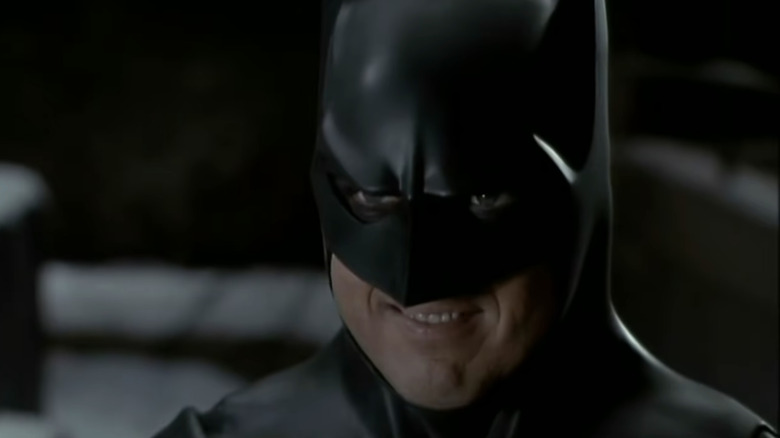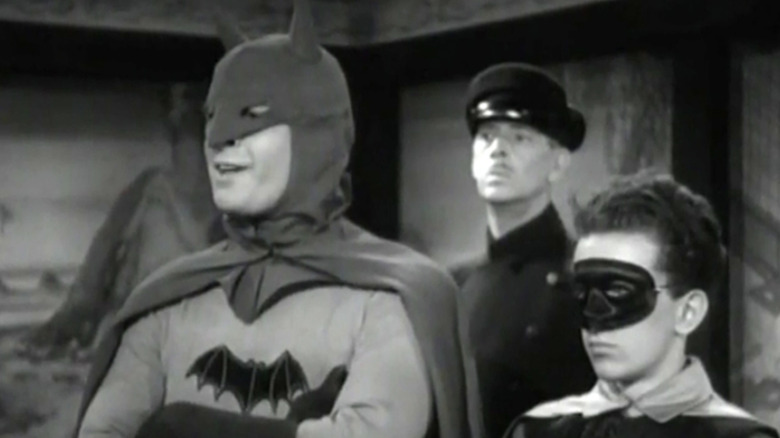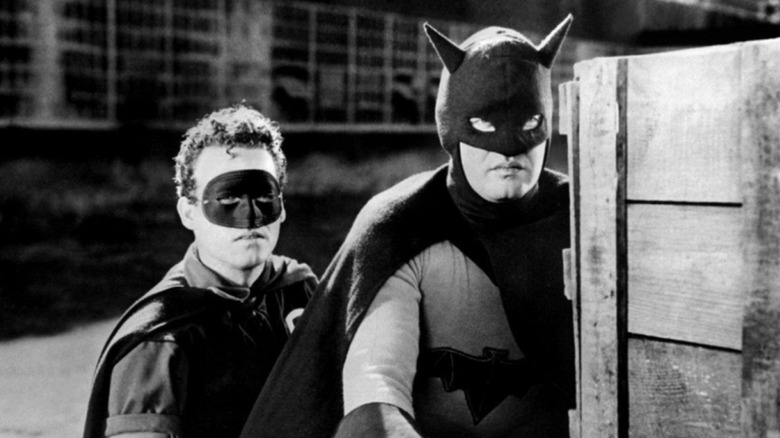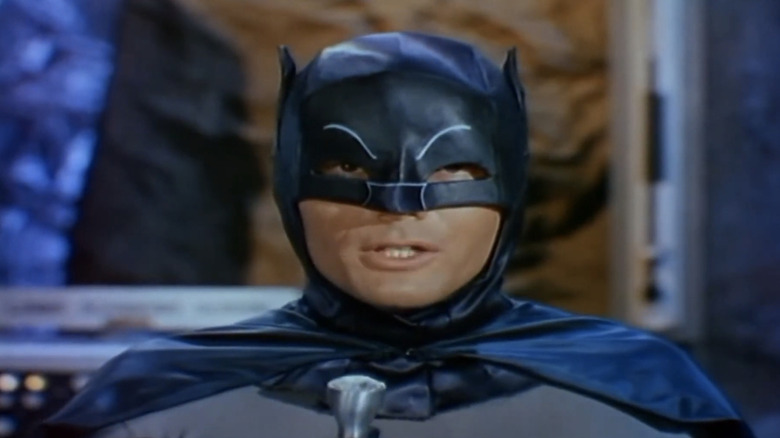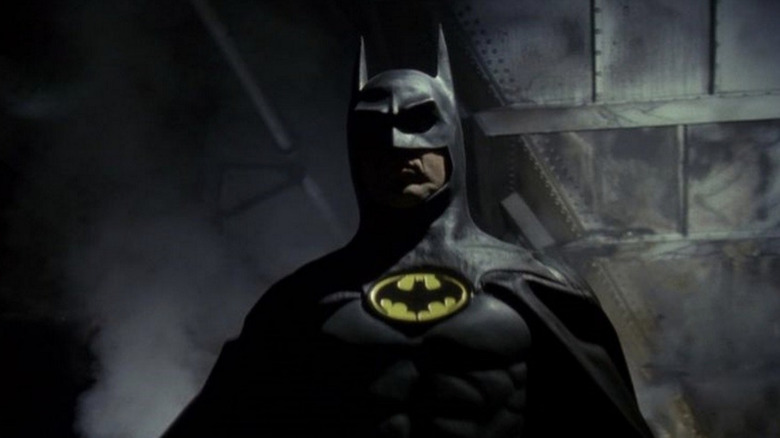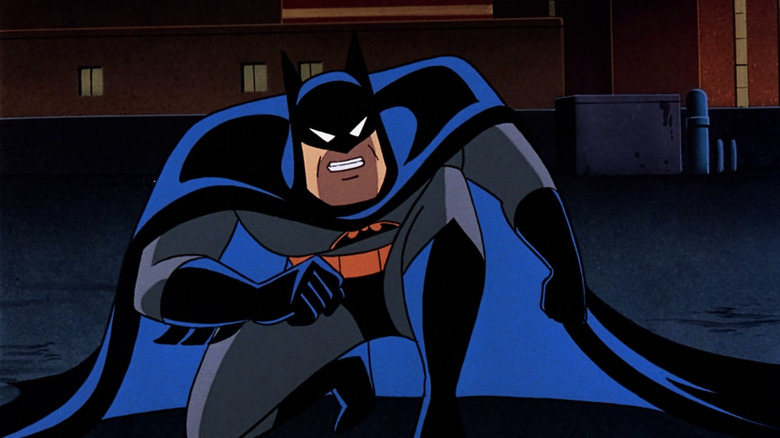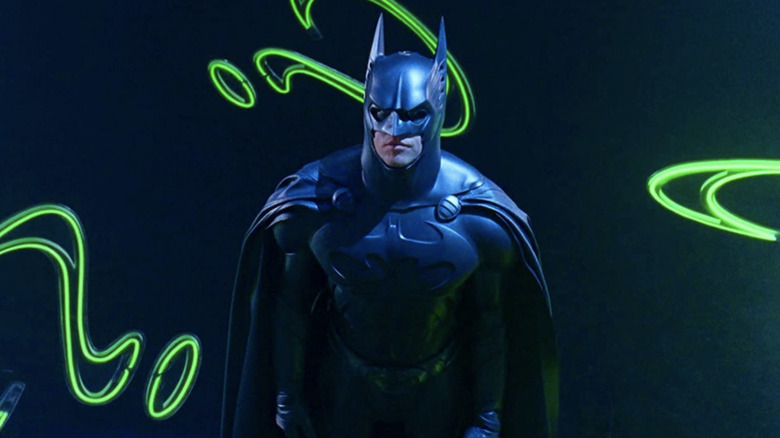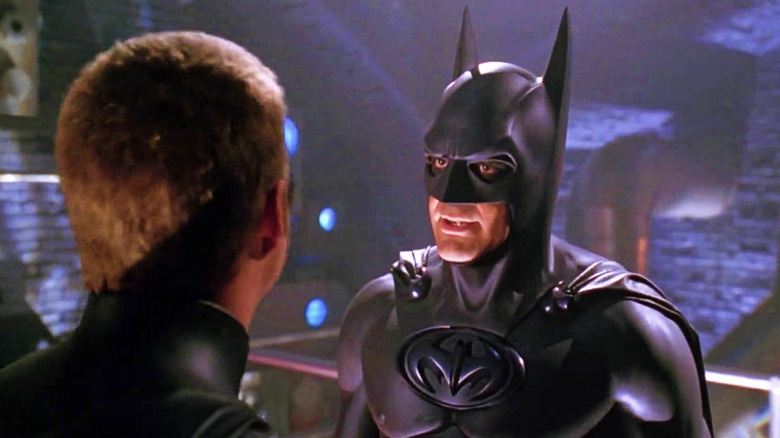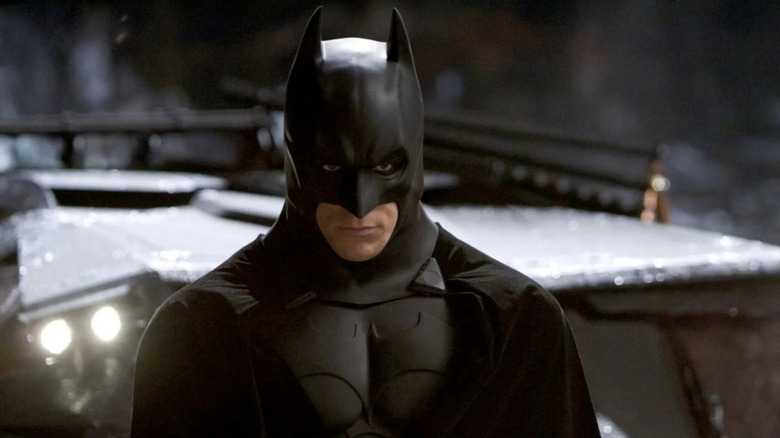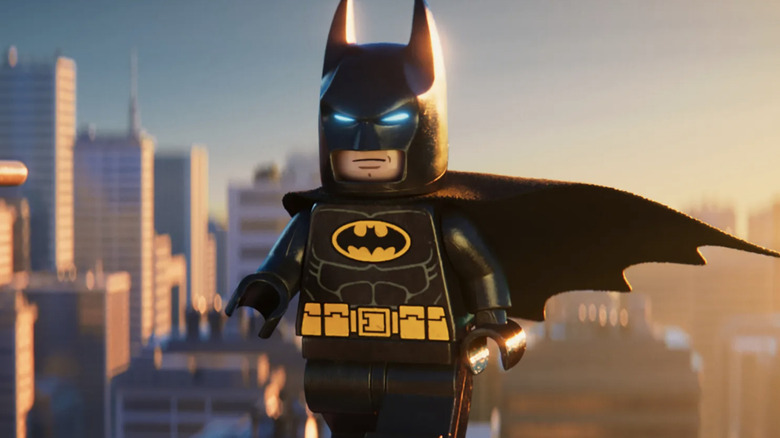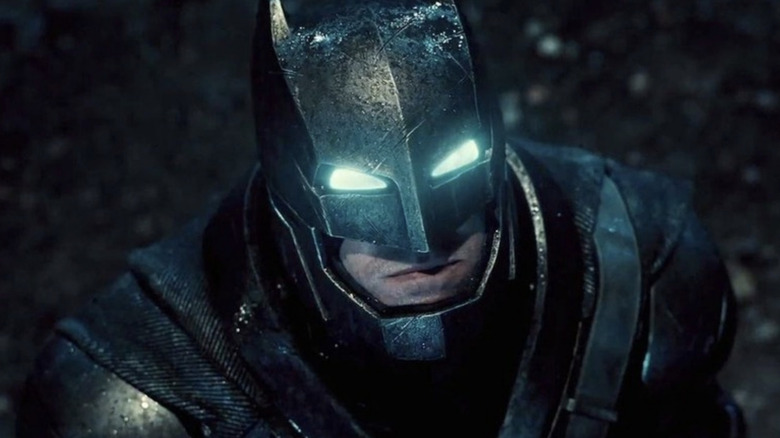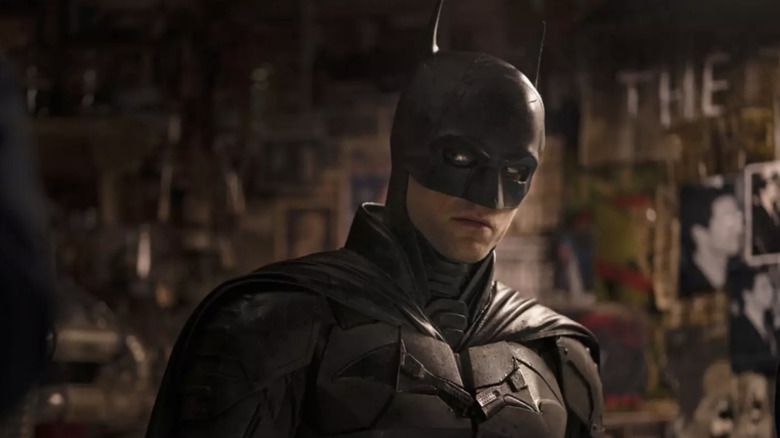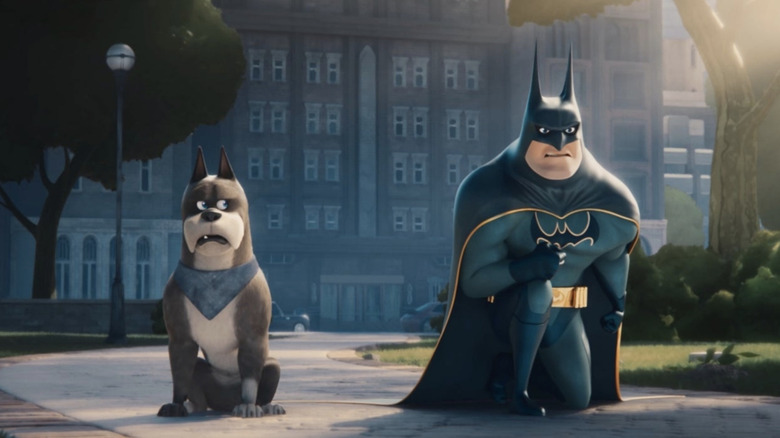Every Batman Movie Actor In Order
Is there another comic book superhero as bankable as Batman? Considering there's a Batman-related phenomenon out there called "Batmania," it's hard to see how any other character could exude such pop culture influence. Since the late 1930s, Batman has been in the entertainment business, but it's the character's movie adaptations that have captivated most. Whether you prefer the campy Adam West or the gritty and grim Christopher Nolan trilogy that starred Christian Bale, there's a Batman out there for everybody. In fact, there are probably more big-screen interpretations of the Dark Knight than you perhaps even realized.
Batman's on-screen history begins in the 1940s and extends far into the 21st century, where now multiple versions of the Caped Crusader exist simultaneously — even within the same picture. Movies like "Batman," "The Dark Knight," and "The Batman" have cemented the character in our collective pop culture consciousness, and for good reason. If you've been wondering who played the Dark Knight in theaters, then these are the Batman actors that you need to know. Though, a brief note for all you completionists out there: We're not considering Batman movies that were initially made for a direct-to-video format that also received limited theatrical screenings, such as "Batman: Under the Red Hood," "Batman: The Long Halloween," or "Batman: The Killing Joke." These are the actors who played Batman in movies intended specifically for theatrical release.
Lewis Wilson
The very first live-action Batman, Lewis Wilson played the Caped Crusader in the 1943 film serial simply titled "Batman." For the uninitiated, film serials weren't traditional movies, but chapter films that told a single narrative over the course of multiple installments that aimed to keep folks coming back for more. Since these chapters are about as long as a half-hour episode of television, the 15-chapter "Batman" is over 4 hours in total length. In any case, the serial starred Wilson as Bruce Wayne, aka Batman, who fights crime alongside his ward Dick Grayson, aka Robin (Douglas Croft).
In the case of this film serial, however, Batman and Robin aren't traditional crime-fighters. They're actually secret agents who work alongside the U.S. government in order to uncover a deadly Japanese plot in Gotham City. Given that the film was released during World War II — and DC Comics was known for its part in the war effort — it makes sense that this Columbia Pictures-produced serial would connect back to current events. But Wilson's Batman isn't quite the character most have come to know over the years. Though he plays Bruce Wayne well, brining a sense of comedy to the rich playboy personality, his Batman leaves much to be desired.
Robert Lowery
After the success of the original "Batman" film serial, Columbia worked hard on a sequel. Titled "The New Adventures of Batman and Robin, the Boy Wonder," though often referred to as "Batman and Robin," the sequel was released in 1949. But this time, Robert Lowery took over the cape and cowl from Lewis Wilson, and Douglas Croft's Robin was replaced with Johnny Duncan. The new Dynamic Duo battle a villain known only as the Wizard (Leonard Penn), who can control cars from a remote location. Another 15-chapter saga clocking in at just under 4 and a half hours, "Batman and Robin" was a bit lackluster. The characters don't even change cars whenever driving around in or out of costume.
Compared to Wilson, Lowery was a more imposing Batman. The costume improvements helped too, even if his ears still looked more like devil horns. His physical presence was impressive, and he had the right look for the Dark Knight. Though Lowery's Bruce Wayne wasn't as fine-tuned as Wilson's, he remained a solid addition to the Dark Knight's big-screen saga. Lowery is an often forgotten Batman, but one who well-resembled the original comic book character.
Adam West
In 1966, Batman made a splash on television screens, launching the first round of Batmania. After the 1st season of the live-action superhero TV series, "Batman" expanded to the big screen with "Batman: The Movie." Unsurprisingly, Adam West and Burt Ward reprised their roles as the Dynamic Duo. Adam West's Batman has been long known as the campiest of the bunch, and "Batman: The Movie" is a fine representation of what made the original TV show so special. West's performance as Batman is iconic, and a great live-action depiction of the Silver Age incarnation of the character — whose adventures were as riddled with science-fiction as much as they were standard crime-fighting.
Adam West played Batman with a dramatic fervor that was believable even if the Caped Crusader was reaching for his "shark repellent bat-spray." As Bruce Wayne, West was cool, almost like an undercover agent. This is especially evident in his scenes with the Catwoman-in-disguise Miss Kitka (Lee Meriwether). As the Dynamic Duo battle all four of their main adversaries — including Joker (Caesar Romero), Penguin (Burgess Meredith), and Riddler (Frank Gorshin) — their only big-screen adventure was an explosive ride. The fact that Batman and Robin restore the United Nations from literal dust is a perfect depiction of the sort of outlandish material "Batman: The Movie" had to work with.
Michael Keaton
It would be over 20 years before audiences saw the Caped Crusader on the big screen again, and live-action Batman media would never be the same. In 1989, the Tim Burton-directed "Batman" hit theaters, and viewers were introduced to Michael Keaton's version of the Dark Knight. Darker, grittier, and more akin to comic books like Alan Moore's "The Killing Joke" and Frank Miller's "The Dark Knight Returns" than the silliness of the Silver Age, "Batman" re-defined the character in popular culture. If you want to know what it was like to see "Batman" in 1989, the Batmania was off the charts. The film's success even led to "Batman: The Animated Series."
Between "Batman" and the 1992 sequel "Batman Returns," Michael Keaton masterfully played both Batman and Bruce Wayne, honoring the character's long-lasting split persona by giving the Dark Knight an undeniable presence and his alter-ego a complexity never-before-seen on the screen. To this day, many still consider Keaton's performance to be the definitive portrayal of the DC character, which explains why he came back from retirement over 30 years later in 2023's "The Flash." While Keaton wasn't bad in his third outing (even if the film itself is poor), it's "Batman" and "Batman Returns" that truly define his masterful performance as Batman.
Kevin Conroy
The second theatrically-released Batman movie to spawn from a television series, and the character's first animated feature, "Batman: Mask of the Phantasm" is arguably the best Batman movie out there. Jumping off from "Batman: The Animated Series," Kevin Conroy voices Batman like no other. There's a reason that so many consider him the definitive Batman actor. The gravitas in his portrayal is both stylish and loaded with emotional richness, and considering the material, it just makes sense. "Mask of the Phantasm" reveals Batman's origins, dissects Bruce Wayne's desire for a normal life, and pits the Dark Knight against the Joker (Mark Hamill) in an epic showdown unmatched in live-action. Conroy may be good in "Batman: The Animated Series," but he's at his very best in "Batman: Mask of the Phantasm."
It's hard to talk about Conroy's performance as Batman here without the loaded weight of his greater work as the character. From animated series to video games to animated features to live-action television, Conroy played Batman for 30 years, with his final performance (in "Justice League: Crisis on Infinite Earths — Part Three") released posthumously in 2024. Still, no work was ever quite like "Batman: Mask of the Phantasm," which stretched the Caped Crusader to the limits of his animated potential. While the 1993 film was technically a box office failure, it garnered a massive cult following after being released on home video.
Val Kilmer
After Tim Burton's third Batman outing was shelved, Warner Bros. opted to continue the franchise in a completely new direction. Gone was the dark, gothic aesthetic of the Burton pictures, and instead, the Dark Knight returned to a campier look and style. Director Joel Schumacher helmed 1995's "Batman Forever," which not only introduced '90s audiences to the first live-action Robin (Chris O'Donnell) in decades, but a brand-new Batman to boot. Val Kilmer was the Caped Crusader in this third film in the series. However, he didn't just gain a sidekick this time around, but also a new love interest in Dr. Chase Meridian (Nicole Kidman) and new enemies in Tommy Lee Jones' Two-Face and Jim Carrey's the Riddler.
Coming off the heels of "Tombstone," Kilmer's portrayal of Batman is nuanced and effective, bogged down mostly by Schumacher's strange directorial choices. But Kilmer was a one-and-done type of Caped Crusader, and opted not to return for the next sequel. "Whatever boyhood excitement I had was crushed by the reality of the Batsuit," the actor explained in the 2021 documentary "Val." "Yes, every boy wants to be Batman. They actually want to be him ... not necessarily play him in a movie." It's a shame that Kilmer wasn't given better material to work with because he might've just been a finer Batman.
George Clooney
The box office success of "Batman Forever" prompted Hollywood to do what it always does — bleed a franchise dry. Joel Schumacher returned for another installment, as did Chris O'Donnell as the Boy Wonder and Michael Gough as Alfred Pennyworth (who had been with the series since the '89 film). But with Val Kilmer out, Warner Bros. looked elsewhere for a leading man worthy of the cape and cowl, ultimately landing on George Clooney. Clooney's Batman first appeared in "Batman & Robin," which was so unanimously hated by audiences and critics that it killed the entire franchise. Unfortunately, neither Clooney's Batman or Bruce Wayne are really all too great either.
Ultimately, Joel Schumacher's third "Batman" was shelved, and, years later, the director apologized for making "Batman & Robin" in the first place. Even now, Clooney's Batman is one of the most despised portrayals, feeling far too wooden and lifeless compared to previous (and certainly future) depictions of the character. While it seemed as if fans were free from this version forever, a last-minute post-production change brought Clooney back as Bruce Wayne for the final moments of 2023's "The Flash," and what a sour note to end the DC Extended Universe on. Clooney wasn't just there to witness the death of the original Batman franchise, but the entire DCEU as well.
Christian Bale
In 2005, up-and-coming filmmaker Christopher Nolan was handed the reins to the Batman franchise, rebooting the tale entirely with "Batman Begins." For the first time since the original Tim Burton film, it felt like the Dark Knight was getting his real on-screen debut, with Christian Bale now cast as Bruce Wayne-slash-Batman. Unlike previous outings, "Batman Begins" sought to tell the story more from Bruce Wayne's perspective, humanizing the character and giving him layered backstory that contributes to his crime-fighting persona. With a stellar supporting cast, the film was a clear step in the right direction, and Bale's performance was largely responsible for its success.
Bale returned as Batman in 2008's "The Dark Knight," which is still considered one of the greatest comic book movies ever made, and the trilogy's 2012 conclusion, "The Dark Knight Rises." While his later appearances may not feel terribly close to the DC Comics character, Bale commands the screen with a nuanced portrayal that grounds Batman (mostly) in reality. The Dark Knight trilogy would be partially responsible for renewing Warner Bros.' interest in DC Comics film adaptations, and Bale's three-picture performance would go down as one of the best in Bat-history. It's no wonder that Bale would play Batman again, provided Nolan was somehow involved.
Will Arnett
The first Batman to appear on the big screen in a strictly comedic context, Will Arnett's Lego Batman first showed up in 2014's "The Lego Movie." Proving himself a breakout character, he was rewarded his own spin-off film, "The Lego Batman Movie," in 2017. But Arnett doesn't exactly play Batman, per se. His Dark Knight, though named Bruce Wayne and still a superhero due to personal tragedy, is more of a parody on the original character. Lego Batman is far more influenced by pop culture's take on Batman than any specific comics or depictions. Yet, Arnett manages to deliver a truly profound and meaningful performance, especially in his solo film.
"The Lego Batman Movie" is the first time that the entire Bat-family has been seen together on the big screen, and the film uses that to its advantage. As Will Arnett's Lego Batman learns to ask for and accept the help of others, he finds that he can overcome his greatest fears and defeat the Lego Joker (Zach Galifianakis) once and for all. Arnett reprised his role as the Master Builder in 2019's "The Lego Movie 2: The Second Part," and a sequel to his solo film was in the works (which would've followed a Lego Justice League). Unfortunately, those pieces fell apart after Warner Bros. was dropped by Lego in favor of Universal. Since Batman is strictly a Warner Bros. property, we're unlikely to see Arnett's Lego Batman again.
Ben Affleck
After Zack Snyder rebooted Superman with "Man of Steel" (which was produced by Christopher Nolan), he set his sights on bringing the Dark Knight back to the big screen. In 2016, Henry Cavill's Superman was pit against Ben Affleck's Batman in "Batman v Superman: Dawn of Justice," which delivered a far darker (and more broken) version of the Caped Crusader. When we first meet Affleck's Batman, he's a man broken by years of unrewarding crime-fighting and deep loss (his Robin was killed by the Joker). Things only get worse after General Zod's (Michael Shannon) invasion shows him how powerless he really is, and he vows to kill Superman to reset the scales of justice.
Ben Affleck's Batman is a lot more akin to the version found in Frank Miller's "The Dark Knight Returns," but over the course of the 2016 film, he is reminded what it means to be a hero. In fact, the DCEU Batman is so inspired by Superman's heroic sacrifice, that he decides to surround himself with other super-powered individuals in "Justice League." The Batman with the most on-screen appearances (including "Suicide Squad," "The Flash," and the Snydercut of "Justice League"), Ben Affleck plays the hero arguably the closest to the way he exists within the greater world of DC Comics. Not only is his Batman a skilled fighter, an imposing force, and a competent leader, but he goes up against small-time crooks and interdimensional alien warlords alike. He deserved far better.
Robert Pattinson
Despite the fact that Ben Affleck's Batman has appeared in the most films, we never got a solo outing with the character, though not for lack of trying. Affleck had tried to get his own Batman film off the ground, but eventually the project died out. After Affleck was out, director Matt Reeves signed on and cast Robert Pattinson as his younger take on the World's Greatest Detective. It wouldn't be until 2022 that "The Batman" hit theaters, but it certainly made waves when it did. Inspired by gritty '90s thrillers like "Seven," the reboot returned the character to his early detective roots and pushed Batman to move beyond just fighting for vengeance, learning to be Gotham's symbol of hope as well.
Pattinson's Batman is powerful. Not only is he a dynamic force to be reckoned with, but his emotional instability further deconstructs the character before building him back up. The actor plays the Batman part well, even if his Bruce Wayne is too much of an edgelord to be taken entirely seriously. Still, his moments with Paul Dano's Riddler and his partnership with James Gordon (Jeffrey Wright) is peak Batman content. As we anxiously await "The Batman – Part II" (here's what we know so far), the first film continues to impress. Sadly, Pattinson didn't reprise his role for "The Penguin," but we just know that "The Batman" star is saving his best for the next big-screen outing.
Keanu Reeves
Only a few months after Robert Pattinson's take hit theaters, Warner Bros. released "DC's League of Super-Pets," which is about exactly what you might expect. While the leading role goes to Dwayne Johnson's Krypto, Kevin Hart plays the Boxer mix named Ace, who receives super strength and near-invulnerability after being exposed to a piece of orange Kryptonite (one of the many different colors of Kryptonite). By the end of "League of Super-Pets," Ace is adopted by none other than the Caped Crusader himself, voiced this time around by Keanu Reeves. Reeves' Batman is a lot like Will Arnett's in that he's mostly a meme of the way the Dark Knight is seen throughout pop culture, but it works.
"DC's League of Super-Pets" isn't the most notable big-screen adaptation on this list, but it's kinda fun to see Reeves play Batman, even if it's just voice work. The way he shamelessly discusses Batman's childhood trauma is hilariously deadpan and prompts laughs all around. With James Gunn's new DC Universe underway, there still hasn't been any official Batman casting announcement, though the character certainly exists in this new franchise. If anyone could make the jump from animation to live-action seamlessly, it would be Keanu Reeves.
